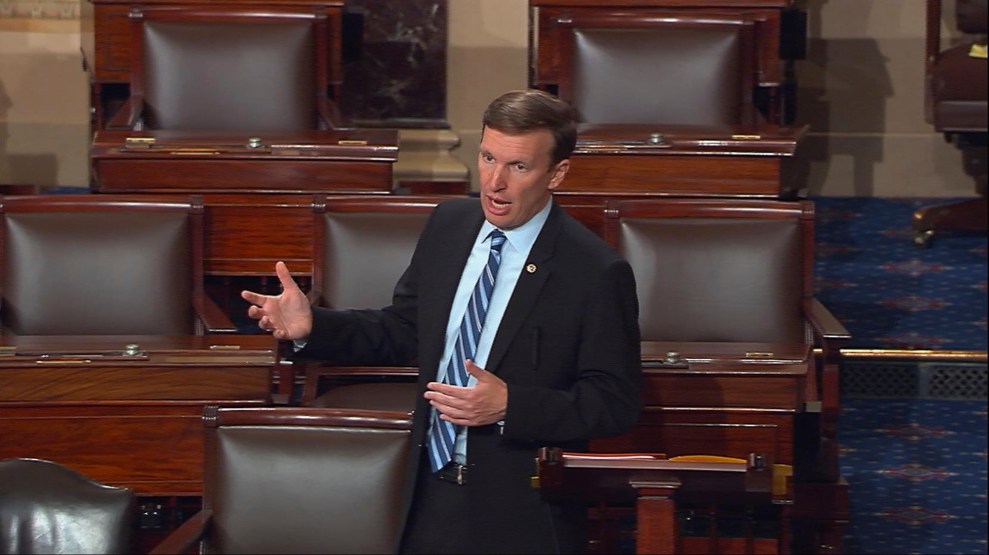
Gun enthusiasts view Sig Sauer rifles at the NRA's annual convention in May 2016.John Sommers II/Reuters via ZUMA Press
In a special Senate session on Monday, US lawmakers once again voted down gun safety regulations introduced in the aftermath of a mass shooting. Each measure needed 60 votes to pass.
The Democratic proposals were brought by Sen. Dianne Feinstein (D-Calif.), and Sen. Chris Murphy (D-Conn.), who led a nearly 15-hour filibuster last week to pressure Republican leaders to hold Monday’s vote. Feinstein’s proposal would have made it possible for the Justice Department to stop anyone from purchasing a firearm if the purchaser has been on the federal terrorist watchlist in the prior five years, a measure backed by the White House. “To me, this isn’t a gun control issue, this is a national security issue,” Feinstein said. “Terrorist groups…know that our gun laws are weak and can be exploited.”
Murphy’s amendment sought to close the so-called gun show loophole—requiring background checks universally for gun buyers, including Internet sales, as well as expanding the federal background check database.
The final votes on these two measures both came in at 47-53 mostly along partisan lines. Sen. Mark Kirk (R-Ill.) was the only Republican to vote in favor of both Democratic bills. Sen. Jon Tester (D-Mont.), chair of the Democratic Senatorial Campaign Committee, voted against Murphy’s measure on background checks. Sen. Kelly Ayotte (R-N.H.) voted for Feinstein’s bill, but against Murphy’s.
The GOP proposals were brought by Sen. John Cornyn (R-Texas) and Sen. Chuck Grassley (R-Iowa). Cornyn’s amendment, similar to one he unsuccessfully introduced last year, required law enforcement to be notified when anyone on the terrorist watchlist attempts to buy a weapon from a licensed gun dealer. If the purchaser has been on the watchlist in the prior five years, the sale could be blocked for up to 72 hours while the attorney general investigates. However, the government would have to show probable cause that the suspect is indeed a known or suspected terrorist.
“If they’re too dangerous to buy a firearm, they’re too dangerous to be loose on our streets,” Cornyn said. “Islamic extremists want the American people to trade our liberties and values with fear and panic.”
Grassley’s proposal sought to expand funding for the federal background check system and would have defined what it means to be found “mentally incompetent.” The measure also included a process for individuals to challenge a disqualifying diagnosis of mental illness. Sen. Joe Donnelly was the only Democrat to vote in favor of Grassley’s amendment; he also voted in favor of Cornyn’s proposal, as did Democratic Sen. Joe Manchin (W. Va.).
The final votes on these two measures both came in at 47-53, mostly along partisan lines.
The failed measures come in the wake of a massacre in a LGBT club in Orlando that left 49 dead, the worst mass shooting in modern US history.
The votes were deja vu all over again. Last December, Republicans (and a single Democrat) blocked the Denying Firearms and Explosives to Dangerous Terrorists Act of 2015 amendment in the Senate; brought by Sen. Feinstein, it would have empowered the attorney general to use the FBI-administered terrorist watchlist to deny the sale of a firearms to suspected terrorists.
Also in December, a NRA-backed measure brought by Sen. Cornyn aimed to implement a 72-hour delay for gun purchases by people on the watchlist so that the government could investigate them. It also failed.
According to the New York Times, as of September 2014, there were 800,000 people on the consolidated federal terrorist watchlist. Feinstein said in her remarks on the floor on Monday that there are currently around 1 million people on the list, less than 1 percent of whom are American citizens.













